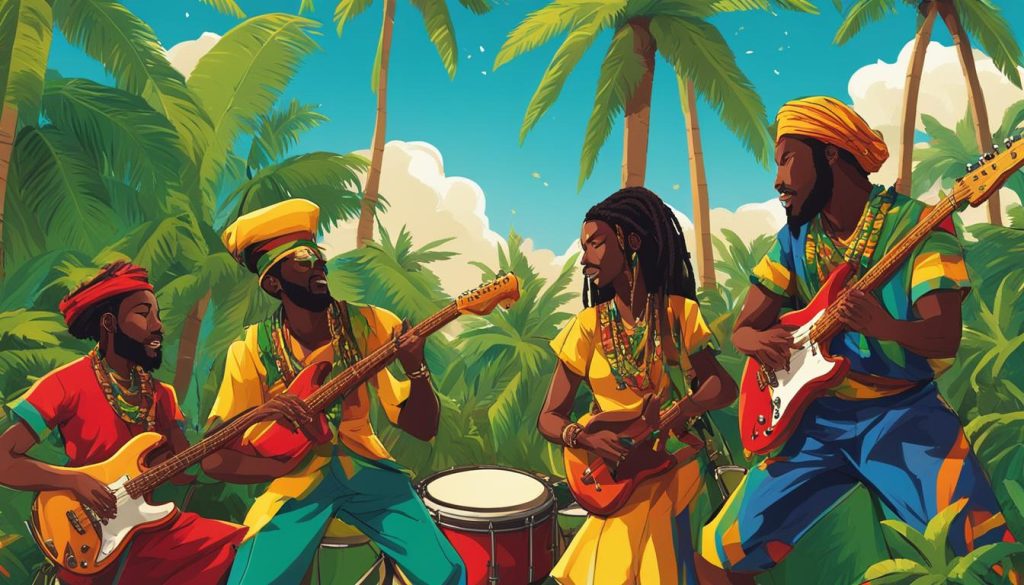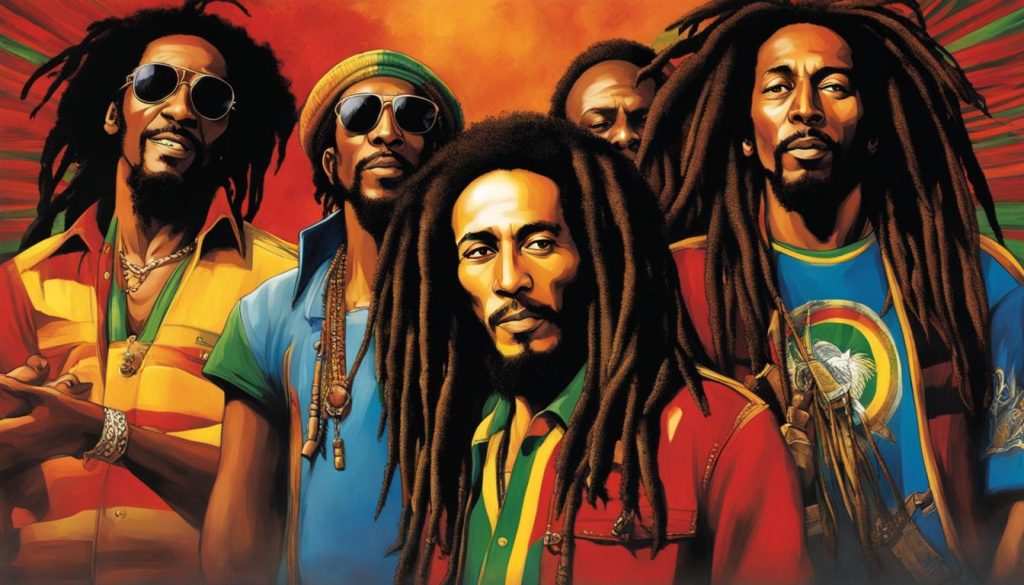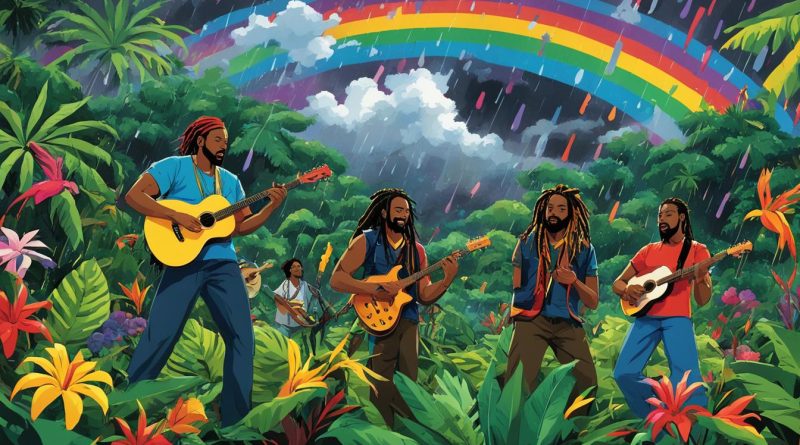Essential Guide to Reggae Music Origins & Hits
Reggae music is a genre of music that originated in Jamaica in the 1960s. A fusion of various musical styles, including R&B, Jazz, and African rhythms, reggae music has become synonymous with the island nation and its culture.
In this section, we will explore the origins of reggae music, tracing its evolution from Jamaican music styles such as ska and rocksteady. We will also delve into the genre’s influential hits throughout the years and the cultural significance and impact they have had on the music world.
Key Takeaways:
- Reggae music originated in Jamaica in the 1960s.
- It evolved from Jamaican music styles such as ska and rocksteady.
- Reggae music has become synonymous with Jamaican culture.
- Its hits have had significant cultural and musical impact worldwide.
- The genre’s messages of social justice, spirituality, and love have left a lasting impact on countless musicians and listeners.
The Rise of Reggae Music
The roots of reggae music can be traced back to Jamaica and its predecessors, ska and rocksteady. Ska originated in the late 1950s and was characterized by its upbeat tempo and horn section. Rocksteady emerged in the mid-1960s and slowed the tempo down, incorporating more soulful vocals and an emphasis on the bass line.
Reggae music was heavily influenced by Rastafari culture, which emphasizes social justice and spiritual enlightenment. This is reflected in reggae’s lyrical themes, which often address socio-political issues and spiritual awakening.
The musical style of reggae is characterized by its distinctive rhythm, known as the “one drop.” This is created by emphasizing the third beat of each measure, while minimizing the emphasis on the first and second beats.
Reggae gained popularity in the 1970s, largely due to the rise of Bob Marley and the Wailers. Marley’s music spoke to the struggles of the Jamaican people and his message of unity and love resonated with audiences worldwide.

Impact of Rastafari Culture
Rastafarianism has had a significant impact on reggae music, both lyrically and stylistically. Its influence can be heard in the religious and spiritual themes of reggae music, as well as in its use of symbolism and imagery.
The Rastafari movement emerged in Jamaica in the 1930s and was inspired by the coronation of Ethiopian Emperor Haile Selassie I. Rastafarians believe that Selassie is the messiah and that black people are the chosen people of God. They also advocate for social and economic equality and criticize the political establishment.
Many reggae musicians have embraced Rastafarianism and its ideals, using their music as a means of promoting social justice and spiritual awakening. The influence of Rastafarianism on reggae has helped to give the genre its unique identity and enduring appeal.
Iconic Reggae Hits
Reggae music has produced some of the most timeless hits in music history. From the legendary Bob Marley and the Wailers to Toots and the Maytals and Jimmy Cliff, these artists have created masterpieces that have captivated audiences worldwide.
Dive into the memorable melodies, powerful messages, and distinctive rhythms that have made these songs iconic within the reggae genre. Bob Marley’s “No Woman, No Cry,” Toots and the Maytals’ “Pressure Drop,” and Jimmy Cliff’s “The Harder They Come” are just a few examples of reggae classics that have stood the test of time.
These songs not only showcase the immense talent and creativity of their respective artists but also embody the spirit and cultural significance of the reggae genre. With their themes of social justice, spirituality, and love, they continue to inspire and resonate with listeners across generations and continents, cementing their place in music history.
Unlock the power of reggae classics and experience the world of sound and meaning that they have created.

Conclusion
Reggae music’s legacy continues to resonate worldwide, transcending borders and cultures. Its powerful messages of social justice, spirituality, and love have not only defined the genre but also left a lasting impact on countless musicians and listeners. The global influence of reggae can be felt in music genres beyond its roots, from pop to hip hop and everything in between.
The enduring popularity of reggae music is a testament to its unique sound and universal themes. From Bob Marley and the Wailers to Toots and the Maytals and Jimmy Cliff, reggae classics have captivated audiences for decades and continue to do so today. The world has embraced the rhythm, groove, and spirit of reggae music, allowing it to transport them to the vibrant world it has created.
As the genre evolves and new artists emerge, the legacy of reggae music lives on. Its influence on popular culture cannot be denied, and its message of love and unity continues to inspire and uplift people all over the world.
FAQ
What are the origins of reggae music?
Reggae music originated in Jamaica during the late 1960s. It evolved from earlier Jamaican music styles such as ska and rocksteady, with influences from Rastafari culture and African rhythms.
Who are some of the iconic reggae artists?
Some of the most influential reggae artists include Bob Marley and the Wailers, Toots and the Maytals, and Jimmy Cliff. Their music has had a profound impact on the genre and has garnered international recognition.
What are some of the classic reggae hits?
Some classic reggae hits include “One Love” by Bob Marley, “Pressure Drop” by Toots and the Maytals, and “The Harder They Come” by Jimmy Cliff. These songs are considered timeless within the genre.
What is the cultural significance of reggae music?
Reggae music is known for its powerful messages of social justice, spirituality, and love. It has played a significant role in the empowerment of marginalized communities and has become a symbol of resistance and unity.
How has reggae music influenced the music world?
Reggae music has had a global influence, shaping various genres and inspiring artists across different cultures. Its distinctive rhythms and lyrical themes have left a lasting impact on popular music, contributing to its enduring popularity.
Why is reggae music so popular?
Reggae’s popularity stems from its infectious grooves, meaningful lyrics, and its ability to connect with people on a deep emotional level. The genre’s universal messages touch upon shared human experiences, making it relatable and appealing to a wide audience.
How has reggae music evolved over the years?
Over the years, reggae music has evolved and integrated various elements from other genres such as dancehall, dub, and reggaeton. This evolution has helped keep the genre fresh while still maintaining its distinct sound and cultural essence.
